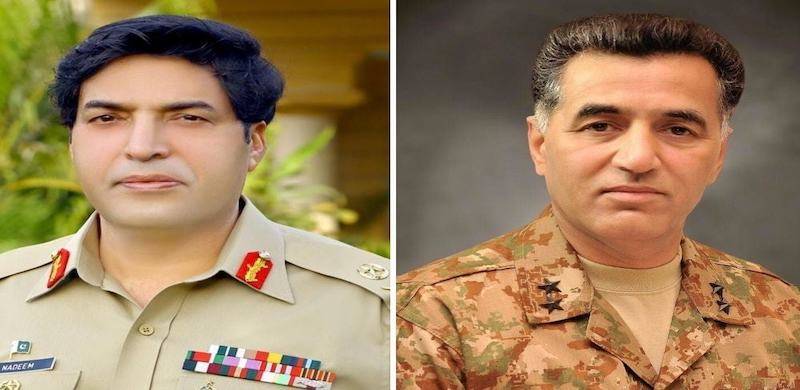
All is well that ends well. Yes, on the face of it. The story of the routine transfer and posting of the Inter Services Intelligence (ISI) chief that had kept the entire nation on the tenterhooks for well over 20 days, at times assuming the proportion of being a colossal clash of the titans over which one of the two -- the prime minister or the army chief -- dictates the mutual terms of their engagement, finally did end with both getting what they had wanted, though with a time lag of about three weeks. No losers, no winners.
But then if that is what was to happen finally, what was the need to try and iron out the wrinkles in public? Why couldn't the two have talked it over privately, no matter how long it took them to reach an agreement finally, since the two were supposed to be on the same page?
Indeed, when the October 6, 2021 ISPR press release announced the transfer of ISI Director General Lt. Gen. Faez Hameed to Peshawar Corps and in his place posting of Karachi Corps Commander Lt. Gen. Nadeem Anjum, along with the postings and transfers of a number of other top officers from and to various positions, one had assumed that all the required rules and traditional norms that had anything to do with the routine transfer and posting of the ISI Chief had been adhered to in letter and spirit.
The traditional practice in the transfer and posting of the ISI chief, as understood by those in the media who closely follow such Defence matters, is: The COAS sends a list of three eligibles to the PM who selects one from among the three and issues the necessary notification. No interviews are held.
Though the posting of a new ISI chief was announced by the ISPR press release seemingly even before he was notified by the PM, no one for a minute thought that the COAS had taken a decision on the matter on his own without first getting the PM’s approval.
It was, therefore, but natural for the media in general to go sensationally viral when the one-page government publicly disagreed with the ISPR press release stating that the no notification of Lt. Gen. Anjum replacing Lt. Gen Faiz Hameed as Director General, Inter-services Intelligence (ISI) has so far been issued by the PM.
The traditional practice in the transfer and posting of the ISI chief, as understood by those in the media who closely follow such Defence matters, is: The COAS sends a list of three eligibles to the PM who selects one from among the three and issues the necessary notification. No interviews are held.
Until the said notification was finally issued by the PM Office on October 27, 2021 it had appeared in part as if the one-page mantra was all but over. And in part it almost resembled the slapstick comedy that was enacted by the government’s legal eagles in August 2019 while attempting to extend the services of COAS General Qamar Javed Bajwa for three more years.
The confusion was further confounded by both the government ministers including Sheikh Rasheed and Fawad Chaudhary as well as by an activist media whose known pundits came up with all kinds of theories and ‘hard inside info’ to explain the ‘disagreement’. Some even linked the happenings to PM Imran Khan’s ‘born-again Muslim’ posturing lately and to his belief since February 2018 in divine interventions. More so because the PM, it was being speculated by Imran Khan’s detractors, wanted the transfer and posting of the ISI chief to take place on a spiritually ordained ‘auspicious’ day.
Both the pro- and anti-government lobbies in the media and in the political circles, one felt, were anticipating something dire to happen, with each hoping the events would follow the course they wished and desired.
Nothing dire has seemingly happened. The PM appears to have had his way—a sort of civilian victory over the army leadership. And the COAS owes an explanation why the appointment of the new ISI chief was announced before the required notification was issued by the PMO.
The PM would not have finally notified the appointment of Lt. Gen. Anjum if he had any reservations about him. And it is unthinkable that the COAS would have named the Karachi Corps Commander without getting the prior consent of the PM. So, the disagreement perhaps was on the date. But what was wrong with the date unless it was not considered by the PM as divinely ‘inauspicious’?
It is an idea too far-fetched, still since the US is known to run its foreign policy based more on symbolism rather than substance perhaps it had wanted Pakistan to attend to some symbolic issues before Wendy R Sherman, US deputy secretary of state met COAS Bajwa on October 8, 2021. And the COAS felt obliged to take some prior confidence building measures (CBMs) to prepare the grounds for an amicable discussions on immediate symbolic issues affecting the bilateral relations, especially relating to Afghanistan?
Perhaps the September 5 photo showing ISI Chief Faiz Hameed having tea in a Kabul Restaurant released to the media was considered too offensive and too cheeky by a defeated but ‘mighty’ US as Faiz Hameed was also heard conveying confidently to Kabul media: “Everything will be okay” in the war-torn country.
So, the COAS transfers Faiz Hameed from his ISI post on October 6 to symbolically satisfy the US but the PM by not issuing the necessary notification for almost 20 days after the ISPR announcement, substantively overrides the transfer decision. But, the PM owes the public an explanation as to why he delayed notifying the appointment of the new ISI chief for three weeks when he had no objections to appointing Lt. Gen. Nadeem Anjum.

